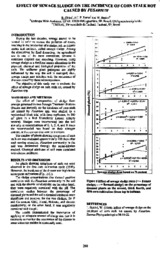Effect of sewage sludge on the incidence of corn stalk rot caused by Fusarium.
Effect of sewage sludge on the incidence of corn stalk rot caused by Fusarium.
Author(s): GHINI, R.; FORTES, N. L. P.; BETTIOL, W.
Summary: During the last decades, sewage started to be treated in order to reduce the pollution of rivers, resulting in the production of a sludge rich in organic matter and nutrients, called sewage sludge. Among the alternatives for final discarding, the agricultural use is one of the most convenient, because it combines disposal and recycling. However, using sewage sludge as a fertilizer causes alterations in the physical, chemical and biological properties of the soils. The soilborne plant pathogens are highly influenced by the way the soil is managed; thus, sewage sludge may interfere with the occurrence of diseases caused by these microorganisms. The objective of this study was to evaluate the effect of sewage sludge on corn stalk rot, caused by Fusarium spp.
Publication year: 2005
Types of publication: Abstract in annals or event proceedings
Unit: Embrapa Environment
Keywords: Corn stover, Fusarium, Milho, Podridão, Sewage sludge
Observation
Some of Embrapa's publications are published as ePub files. To read them, use or download one of the following free software options to your computer or mobile device. Android: Google Play Books; IOS: iBooks; Windows and Linux: Calibre.
Access other publications
Access the Agricultural Research Database (BDPA) to consult Embrapa's full library collection and records.
Visit Embrapa Bookstore to purchase books and other publications sold by Embrapa.

